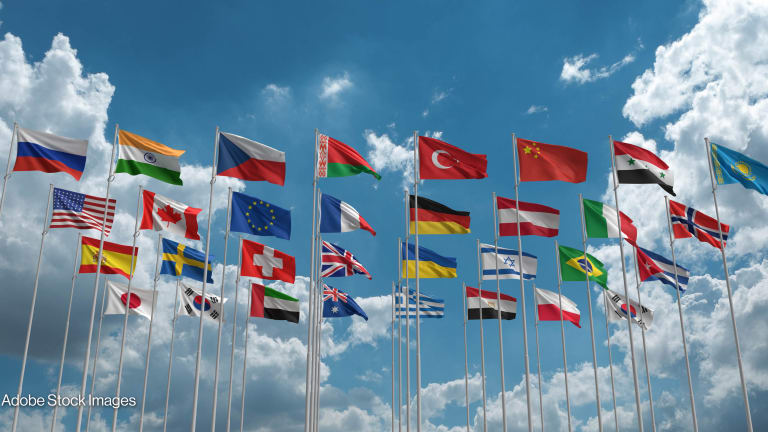
By Jessica Kraus, senior consultant at SEEK Development; Nina Schwalbe, founder and principal at Spark Street Consulting; Gavin Yamey, professor of global health and public policy at Duke University; and Sara Fewer, co-director of the Evidence to Policy Initiative at the University of California.
Last month, 11 multilateral organizations committed to a new Global Action Plan to increase alignment and coordination toward the health-related Sustainable Development Goals at the World Health Summit in Berlin, Germany. This plan is encouraging — particularly its call to strengthen global public goods for health, also known as GPGs.
“Delivering support for GPGs is inherently difficult.”
—GPGs are shorthand for a set of collective action activities that address transnational health challenges, such as research and development for neglected diseases, pandemic preparedness, and global health leadership and stewardship. In 2013, the Lancet Commission’s “Global health 2035: a world converging within a generation” report warned that GPGs are critically neglected.
While essential to achieving the SDGs, only one-fifth of all donor support for health is directed to GPGs. This lack of investment was starkly exposed during the 2014-2016 Ebola outbreak in West Africa, where there was no Ebola vaccine, therapeutic, or rapid diagnostic test, and poor outbreak surveillance.
In a new policy paper, we’ve examined the potential support for GPGs from four organizations that provide the most development assistance for health: Gavi, the Global Fund, World Bank, and World Health Organization. In light of the critical funding gap, and bilateral funding increasingly tied to foreign policy agendas, we found that these organizations are well-placed to deliver support for GPGs. Further, all four multilaterals want to step up their investments in GPGs, and could immediately intensify their cooperation in three areas.
Here are the opportunities we’ve identified:
Opportunity 1: Improve the production, quality, and use of health data
The multilaterals view data quality and harmonization as an important means for facilitating improved, evidence-based policies and fostering greater accountability. They face three major ongoing challenges. First, data are not granular enough — for example, it is often hard to obtain health data disaggregated by province or district. Second, data are not timely enough for decision-making. Third, there is an urgent need for clearer guidance on, and improved exchange of, existing data resources.
Multilaterals agree on three ways to support higher quality, more harmonized data:
Increase efforts to provide more granularity across databases in a timely fashion by supporting countries to improve their national health data and information systems.
Prioritize data exchange efforts.
Provide more guidance to the community on which data resources are best suited for which purposes.
Opportunity 2: Accelerate the development and access to health technologies in low- and middle-income countries
All four multilaterals currently support global access to affordable, high-quality health technologies for those that need it when they need it. But the agencies are faced with two major challenges to achieving this goal. First, when middle-income countries transition away from development assistance for health, they can lose access to high-quality products: product costs become higher and they lose access to price-lowering mechanisms such as pooled procurement. The second is that middle-income countries that never received Gavi or Global Fund support find it hard to afford new health products — e.g., because they do not qualify for Gavi’s vaccine prices.
Looking ahead, as countries’ access to affordable, quality products changes, there are three opportunities for enhanced collective action to improve such access:
Help to sustain transitioning countries’ access to quality products, such as through strengthening procurement and supply chains.
Provide clear and actionable guidance to countries on accessing products as they prepare for transition.
Improve access to new health products in middle-income countries that are not receiving Global Fund/Gavi support.
Opportunity 3: Strengthen global health security, particularly epidemic and pandemic preparedness
Several strategic reforms and new initiatives are underway at these multilaterals to enhance global health security. Despite these improvements, these organizations remain concerned about three gaps: a funding gap; poor national health system capacity in many countries to prevent and respond to emerging infectious diseases and other health emergencies; and the lack of global, independent mechanisms to coordinate decision-making on health security.
Multilaterals agree that they can help countries prevent and respond to cross-border disease threats if they work more closely together to strengthen national health systems, improve capacities of regional networks, and address challenges caused by the transition from donor financing, escalating humanitarian crises, and climate change.
Delivering support for GPGs is inherently difficult, but this research shows that the changing global health landscape — including country transitions from health aid and emerging global health threats — is spurring Gavi, Global Fund, World Bank, and WHO to intensify their joint activities to support GPGs for health.
As these organizations and others work to operationalize the Global Action Plan, they can build upon their shared interest in three essential GPGs: health data, development and access to health technologies, and health security. As one key informant reflected, “it will be a test of global solidarity to see if we can put this [agenda] together.”








